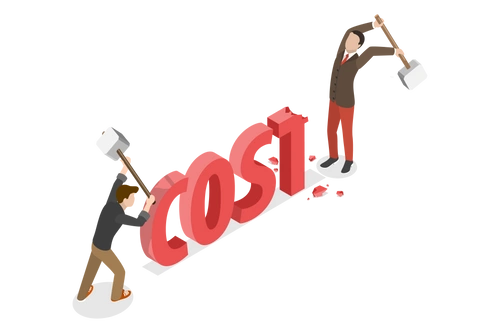
Medicare’s Limiting Charge and Its Impact on Your Healthcare Costs
Understanding the various aspects of Medicare is essential for beneficiaries who want to minimize their healthcare costs. One such aspect, the limiting charge, plays a crucial role in regulating the fees that non-participating doctors can charge for their services. While it may not be the most prominent topic in Medicare discussions, it can significantly impact your out-of-pocket expenses.
What Is the Limiting Charge?
The limiting charge is a cap placed by the federal Medicare program on the amount non-participating doctors can charge beneficiaries for covered services. These “non-participating” providers are healthcare professionals who have not entered into an agreement with Medicare to accept the program's approved payment rates for services rendered. While they still provide services to Medicare beneficiaries, they are allowed to charge more than the Medicare-approved amount for certain services.
It's important to note that there are three types of healthcare providers when it comes to Medicare.
-
Participating providers: These providers have signed an agreement with Medicare to accept the Medicare-approved payment rates for all services provided to beneficiaries. They cannot charge more than the approved amount.
-
Non-participating providers: These providers have not signed an agreement with Medicare to accept the approved rates for all services, but they can choose to accept the Medicare-approved amount on a case-by-case basis. They are subject to the limiting charge when they decide to bill more than the approved amount.
-
Opt-out providers: These providers have opted out of Medicare entirely and do not accept Medicare payments. They can charge patients any amount they choose, and Medicare will not cover the cost of their services.
The limiting charge applies specifically to non-participating providers and acts as a safeguard to ensure that beneficiaries are not overcharged for services.
How Does Medicare’s Limiting Charge Work?
When you visit a non-participating provider, they have the option to accept the Medicare-approved amount for your service or charge more than the approved amount. If they decide to charge more, they must follow the limiting charge rules set by Medicare.
The limiting charge is calculated as a percentage above the Medicare-approved amount for a specific service. Currently, the limiting charge is set at 15% above the Medicare-approved amount in most states, although some states may have different percentages. You’ll need to verify the limiting charge percentage in your state to understand your potential out-of-pocket expenses better.
An Example
Let's say you visit a non-participating provider for a service with a Medicare-approved amount of $100. The provider decides to charge more than the approved amount. In a state with a 15% limiting charge, the most the provider can charge you is $115 ($100 x 1.15). Your out-of-pocket expense would be the difference between the approved amount and the limiting charge, which in this case is $15.
Keep in mind that Medicare Part B typically covers 80% of the approved amount for services, and you are responsible for the remaining 20% (called the coinsurance) plus any amount up to the limiting charge. In our example, you would be responsible for the 20% coinsurance ($20) and the $15 difference between the approved amount and the limiting charge, for a total of $35 out-of-pocket.
Of course, if you have a Medicare Supplement plan that picks up the limiting charges, your cost will be less. In addition, if you have a Medicare Advantage plan, your costs will be different.
The Impact of the Limiting Charge on Healthcare Costs
When choosing a healthcare provider, it's essential to consider the potential costs associated with participating and non-participating providers. Participating providers agree to accept the Medicare-approved amount for services, which means your out-of-pocket expenses will generally be lower. However, non-participating providers can charge up to the limiting charge, potentially resulting in higher out-of-pocket expenses.
Understanding the limiting charge can help you manage your healthcare costs more effectively. By being aware of the potential charges from non-participating providers, you can make informed decisions about which providers to visit based on your budget and coverage needs.
The limiting charge serves as a safeguard against excessive charges for Medicare beneficiaries. However, it's crucial to keep in mind that you'll still be responsible for the Medicare Part B coinsurance (typically 20% of the approved amount) and any charges up to the limiting charge when using non-participating providers.
The limiting charge is designed to protect Medicare beneficiaries from excessive fees that some non-participating providers may attempt to charge. By capping the amount a provider can charge above the Medicare-approved rate, beneficiaries can have more control over their out-of-pocket expenses and avoid surprise medical bills.
Tips for Navigating the Limiting Charge
While the limiting charge provides some level of protection, it's essential to be proactive in managing your healthcare costs by understanding your Medicare benefits, being aware of your provider's Medicare status, and budgeting for potential out-of-pocket expenses. Here are a few tips to help you minimize your expenses.
Find Participating Providers
To minimize your out-of-pocket expenses, it's a good idea to choose participating providers who accept the Medicare-approved amount for services. You can find participating providers using Medicare's online Physician Compare tool or by contacting your local Medicare office for assistance.
Ask Providers about Their Medicare Status
Before scheduling an appointment or receiving services, make sure to ask your healthcare provider about their Medicare status. Inquire if they are a participating, non-participating, or opt-out provider. Knowing this information in advance can help you avoid unexpected costs.
Understand Your Medicare Summary Notice (MSN)
Regularly review your Medicare Summary Notice (MSN) to keep track of your healthcare expenses and ensure you're not being overcharged. The MSN is a document that lists the services you've received, the Medicare-approved amount for each service, and any charges that exceed the approved amount (up to the limiting charge). By reviewing your MSN, you can verify that your providers are abiding by the limiting charge rules and identify any billing errors.
If you have further questions or need assistance in navigating the complexities of Medicare, don't hesitate to reach out to our team at Local Medicare Specialists. Our knowledgeable and dedicated agents are here to help you make the most of your Medicare benefits. Contact us today to schedule a consultation, and let us guide you toward a more informed and confident Medicare experience.
Still Have Medicare Questions?
Schedule a FREE Medicare plan consultation with an agent in your neighborhood.
Privacy and Security: Your privacy and security are extremely important to us. Your personal information is protected by our Privacy Policy
LocalMedicareSpecialists.com is privately owned and operated by LMS Insurance LLC. LocalMedicareSpecialists.com is a non-government resource for those who depend on Medicare, providing Medicare information in a simple and straightforward way.
We do not offer every plan available in your area. Currently we represent 11 organizations which offer 173 products in your area. Please contact Medicare.gov, 1-800-MEDICARE, or your local State Health Insurance Program (SHIP) to get information on all of your options.
